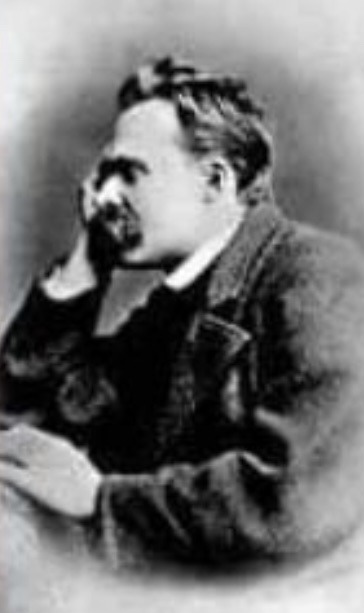#nietzscheism
Explore tagged Tumblr posts
Text


Got the courage to tackle Beyond Good and Evil.
#frederick nietzsche#nietzshe#nietzsche quotes#nietzscheism#books & libraries#books#booklr#bookish#books and reading#fall vibes#dark academia#dark academic aesthetic#fountain pen#kaweco#brass hardware#study aesthetic#study blog#study inspo#studyblr#philosophy#coffee#coffee and books#coffee and reading
808 notes
·
View notes
Text
"La prisa es universal porque todo mundo está huyendo de sí mismo".
Friedrich Nietzsche.
#nietzche#nietzscheism#nietzsche quotes#friedrich nietzsche#nietzsche#spanish#spanish quotes#literary#literature#literatura#escritos#reflexión#frases#escritor#libros#cuentos#citas en español#filosofía#filósofo#libros filosofía
36 notes
·
View notes
Text
"Besides, though Nietzsche was a seer in many domains, he was no guide to interpersonal relationships - has there ever lived a lonelier, more isolated man?" - Irvin Yalom (Love's Executioner)
#nietzscheism#life quote tumblr#life quote#quotes#quotes about life#life quotes#philosophy quotes#literature#deep quotes#existential psychology#philosophy#irvin yalom#existentialism#nietzschequotes#friedrich nietzsche#existential angst#solitude
31 notes
·
View notes
Text

Nietzsche: On the Three Metamorphoses
(Note: the Old Iranian root of the name Zarathustra comes from: Zarat, "golden" combined with ushtra, "camel." This is significant for understanding this passage. Gnostic exegesis is provided in parentheses.)
Of three metamorphoses of the spirit I tell you: how the spirit becomes a camel; and the camel, a lion; and the lion, finally, a child.
There is much that is difficult for the spirit, the strong reverent spirit that would bear much (karma through initiation): but the difficult and the most difficult are what his strength demands.
What is difficult? asks the spirit (of the neophyte) that would bear much, and kneels down like a camel (ushtra in Old Iranian, גמל Gamal in Hebrew) wanting to be well loaded (to take upon itself the bitter path of initiation). What is most difficult, O (solar) heroes, asks the spirit that would bear much, that I may take it upon myself and exult in my (sexual) strength (און aun)? Is it not humbling oneself to wound one's haughtiness? Letting one's folly shine to mock one's (false) wisdom?
Or is it this: parting from our cause when it triumphs (Sattvic action mentioned in the Bhagavad-Gita)? Climbing high mountains (of initiation) to tempt the tempter (Christus-Lucifer)?
Or is it this: feeding on the acorns and grass of knowledge (דעת da'ath, gnosis) and, for the sake of the truth, suffering hunger in one's soul (like Tantalus awaiting the solemn banquet of the Pascal Lamb)?
Or is it this: being (psychologically) sick and sending home the comforters (by not seeking spiritual advice from others, but delving into profound meditation in order to receive wisdom within) and making friends with the (spiritually) deaf, who never hear what you want?
Or is it this: stepping into filthy waters (in transmutation) when they are the waters of truth (poisoned by fornication as mentioned in "On the Rabble" in Part Two of Thus Spoke Zarathustra), and not repulsing cold frogs and hot toads? (This signifies not running away from our own internal, psychological ugliness that we begin to perceive when working with the "hot" and "cold" synpathetic cords of our spinal column, the solar and lunar energetic channels known as Ida and Pingala, which come from our waters, wherein reside the frogs and toads, symbolic of the fertility of Yesod).
Or is it this: loving those who despise us and offering a hand to the ghost (our Innermost) that would frighten us? (since our animal mind is terrified before the presence of the divine; in Hamlet by William Shakespeare, Claudius, the ego, has slain the King of Denmark, and now the ghost of the dead king, the Intimate Being, haunts our very souls through intense spiritual inquietudes).
All these most difficult things the spirit (of the neophyte) that would bear much takes upon itself: like the camel (ushtra) that, burdened, speeds into the desert (מִּדְבָּר Hebrew: mid'bar), thus the spirit (of the neophyte) speeds into its desert (for in the מִּדְבָּר wilderness, the desert of life, we work to incarnate and worship the Word, דָּבָר Dabar, the Christ; see Exodus 3:18).
In the loneliest desert, however, the second metamorphosis occurs: here the spirit becomes a lion (from the Tribe of Judaea through the Venustic Initiation) who would conquer his freedom and be master in his own desert (his מִּדְבָּר mid'bar by incarnating דָּבָר Dabar, the Word). Here he seeks out his last master (the black psychological moon, Lilith): he wants to fight him and his last god (the dragon of darkness of our atomic psychological infernos mentioned by Samael Aun Weor in The Three Mountains); for ultimate victory he wants to fight with the great dragon.
Who is the great dragon whom the spirit (of Christ in the Venustic Initiation) will no longer call lord and god? (for "Thou shalt have no other אֱלֹהִים Elohim, gods, before me." -Exodus 20:3). "Thou shalt" is the name of the great dragon (for our own animal ego takes the commandments, the Law of Moshe, and subverts it for itself; it abuses the law and seeks to make us slaves of Egypt, מצרים Mitzraim, Malkuth). But the spirit of the lion (of the Tribe of Judah, the Cosmic Christ) says, "I will" (or we can say, Eheieh Asher Eheieh אהיה אשר אהיה, "I AM THAT I AM," better translated as "HE IS WHAT HE IS"). "Thou shalt" lies in his way, sparkling like gold, an animal covered with scales; and on every scale shines a golden "thou shalt" (resembling the golden calf of Moloch, mentioned in Exodus 32, and his tenebrous agents of darkness who strive to tempt and slay the Superman).
Values, thousands of years old, shine on these scales (with false, diabolic light); and thus speaks the mightiest of all dragons: "All value of all things shines on me. All value has long been created, and I am all created value (through fornication). Verily, there shall be no more 'I will ( אהיה Eheieh, I AM, or better said, HE IS).'" Thus speaks the dragon (of darkness).
My brothers, why is there a need in the spirit for the lion? Why is not the beast of burden (the initiate who has not incarnated the Lion of Christ), which renounces (self-will) and is reverent (to the Law of Moses), enough?
To create new values—that even the lion (the Bodhisattva of the Straight Path) cannot do; but the creation of freedom for oneself for new creation—that is within the power of the lion (for the acquisition of Mastery is one thing, but perfection in it is another; see the Three Wise Men or Magi in The Gnostic Nativity of Christ). The creation of freedom for oneself (through the First Law of the Glorian) and a sacred "No" even to duty (the written commandments or Second Law: Deuteronomy)—for that, my brothers, the lion (the Bodhisattva) is needed (since only Christ incarnated within the initiate can perform the Great Work by transcending the Second Law). To assume the right to new values—that is the most terrifying assumption for a reverent spirit (the neophyte or initiates who have not yet become lions of Judaea). Verily, to him it is preying (immorality, since the neophytes do not comprehend the Path of the Bodhisattva, the Rebel Christ), and a matter for a beast of prey (who renounces and annihilates the morals of the populace). He once loved "thou shalt" as most sacred (because before incarnating the First Law, one must follow the Second Law): now he must find illusion and caprice even in the most sacred (for he once followed the Second Law, but now must incarnate the Revolutionary Christ, Who transcends the Second Law), that freedom from his love (psychological attachments) may become his prey: the lion is needed for such prey (since only Christ, the First Law, can annihilate the entirety of the ego on the Second Mountain).
But say, my brothers, what can the child (of the Resurrection) do that even the lion (Bodhisattva of compassion) could not do? Why must the preying lion (the warrior of the Straight Path) still become a child? The child (of the Resurrection) is innocence and forgetting (through purification and the waters of Lethe; see also Matthew 18:3), a new beginning, a game, a self-propelled wheel (Sanskrit: chakra, which now turns through the bhava, the becoming, of אהיה אשר אהיה Eheieh Asher Eheieh, "I AM HE WHO BECOMES," "I AM HE WHO INITIATES," see the Bhavachakra course), a first movement, a sacred "Yes." (As Samael Aun Weor stated in Igneous Rose, "Our Innermost is Yes, Yes, Yes. The wisdom of our Innermost is Yes, Yes, Yes. The love of our Innermost is Yes, Yes, Yes.") For the game of creation (as a Cosmocreator), my brothers, a sacred "Yes" is needed (we need our Innermost to be realized within ourselves through Resurrection): the spirit (Kether, upon Resurrection) now wills his own will (for תפארת Tiphereth is united with the will of the Father, for אהיה אשר אהיה "HE IS WHO HE IS"), and he who had been lost to the world (through initiation) now conquers his own world (through Resurrection).
Of the three metamorphoses of the spirit (through initiation) I have told you: how the spirit became a camel (a neophyte on the path of renunciation); and the camel, a lion (of Judah, a Bodhisattva of Compassion); and the lion, finally, a (golden) child (of Alchemy and the Resurrection—golden in Old Iranian is Zarat, which when combined with ushtra, the camel of the renunciate, is Zarathustra).
Thus spoke Zarathustra (the golden camel who traverses the wilderness in order to become a Superman). And at that time he sojourned in the town that is called The Motley Cow (the sacred Hindustani symbol of the Divine Mother Kundalini).
From Thus Spoke Zarathustra: A Book for All and None, translated by Walter Kaufmann.
#frederick nietzsche#nietzsche#friedrich nietzsche#nietzscheism#nietzschean#nietzsche quotes#kabbalah#gnostic kabbalah#alchemy#gnosis#gnosticism#gnostic#chicago gnosis#samael aun weor#gnostic academy of chicago#initiation#spiritual initiation#spirit#spirituality#philosophy#existentialism#spiritual transformation#esoteric knowledge#awakening#consciousness#spiritual#divinity#chicago gnosis podcast#philosophical#spiritual path
14 notes
·
View notes
Text

Friedrich with his german wit
#thoughts#writing#aestehtic#literature#writers and poets#authors#original post#original phography#photography#booksbooksbooks#bookblr#book quotes#books and reading#friedrich#friedrich nietzsche#nietzscheism#nietszche#why am I so clever#german#german philosophy#nietzschequotes#reading#god#atheism#atheist#I am an agnostic btw#I love short penguin classics they are so fun to read#nihilism#nihilist#I would consider myself as an existentialist but...
2 notes
·
View notes
Text

Así se debería aprender a morir; ¡y no debería haber fiesta alguna en que uno de esos moribundos no santificase los juramentos de los vivos! Morir así es lo mejor; pero lo segundo es: morir en la lucha y prodigar un alma grande.
Friedrich Nietzsche
#friedrich#nietzsche#nietzsche quotes#nietzscheism#friedrich nietzsche#quotes#frases#also sprach zarathustra
4 notes
·
View notes
Text
"El hombre ha tenido que crear dioses, así como ha tenido que crear que valores mantuvieran en alto el valor de la existencia"
-Anticristo,Friedrich Nietzsche
#citas en español#latino#cdmxlife#escritos#sentimental#photography#art#notas en español#amor#amor y dolor#friedrich nietzsche#quotes#ralph waldo emerson#bertrand russell#henry wadsworth longfellow#rabindranath tagore#nietzschean#nietzsche ağladığında#nietzscheism#nietzschequotes#existentialism#forgetting
5 notes
·
View notes
Text

#nietzche#nietzscheism#irvin d. yalom#kisiselgelisim#ben ve kendim#kendime düşünceler#felsefe#psikoloji#sanat#sanat tarihi#mitologia#mitoloji#karışık#Spotify
2 notes
·
View notes
Text

El pensamiento del suicidio es un poderoso medio de consuelo: con él se logra soportar más de una mala noche.
~MÁS ALLÁ DEL BIEN Y DEL MAL, FRIEDRICH NIETZSCHE
#suicido#suicidist#mente suicidia#suicidism#frases#nietzschequotes#frederick nietzsche#nietzscheism#friedrich nietzsche#nietzshe#Spotify
5 notes
·
View notes
Text

0 notes
Text

“Nothing is beautiful, only man: on this piece of naivete rests all aesthetics, it is the first truth of aesthetics. Let us immediately add its second: nothing is ugly but degenerate man - the domain of aesthetic judgment is therewith defined.”
Friedrich Nietzsche
#nietzschequotes#nietzche#friedrich nietzsche#nietzscheism#light acadamia aesthetic#light academia#nietzschean
1 note
·
View note
Text

No I will not explain
#artistsoninstagram#digitalart#digitalillustration#digitaldrawing#drawing#procreate#artist#artists on tumblr#procreateart#comics#illustration#nietzscheism#nietzche#friedrich nietzsche#philosophy#anime and manga#magical girl#sailor moon#parody
1 note
·
View note
Text
Todo lo que se hace por amor, se hace más allá del bien y del mal.
Friedrich Nietzsche.
#friedrich nietzsche#nietzsche#nietzschequotes#nietzsche quotes#nietzscheism#escritos#reflexión#frases#escritor#libros#cuentos#citas en español#filosofía#filósofo#libros filosofía#spanish#spanish quotes#literature#literatura#literary#frases de amor#amor#amor y dolor#más allá del bien y el mal
39 notes
·
View notes
Text
"He who cannot lie does not know what truth is." - Friedrich Nietzsche (Thus Spoke Zarathustra).
#life quote tumblr#life quote#quotes#quotes about life#life quotes#philosophy quotes#literature#deep quotes#existential psychology#philosophy#nietzschequotes#nietzscheism#frederick nietzsche#friedrich nietzsche#nietzsche quotes#nietzche
37 notes
·
View notes
Text
thinking has doomed man to a life in his own head and chained him to an existence devoid of self acceptance
Eric Andrei
#quotes#deep quotes#literature#books and literature#mental health#motivation#poetry#booksbooksbooks#philosophy#writing#existentialism#nietzscheism
1 note
·
View note
